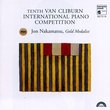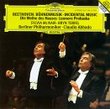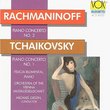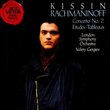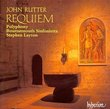| All Artists: Sergei Rachmaninov, Vladimir Ashkenazy, Hélène Grimaud, Philharmonia Orchstra Title: Hélène Grimaud ~ Rachmaninov - Piano Concerto No. 2 Members Wishing: 0 Total Copies: 0 Label: Teldec Release Date: 5/15/2001 Genre: Classical Styles: Forms & Genres, Concertos, Historical Periods, Modern, 20th, & 21st Century, Instruments, Keyboard, Symphonies Number of Discs: 1 SwapaCD Credits: 1 UPC: 685738437627 |
Search - Sergei Rachmaninov, Vladimir Ashkenazy, Hélène Grimaud :: Hélène Grimaud ~ Rachmaninov - Piano Concerto No. 2
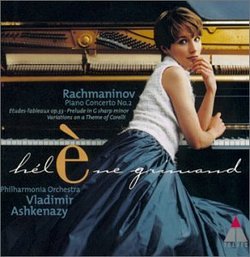 | Sergei Rachmaninov, Vladimir Ashkenazy, Hélène Grimaud Hélène Grimaud ~ Rachmaninov - Piano Concerto No. 2 Genre: Classical
|
Larger Image |
CD DetailsSimilarly Requested CDs
|
CD ReviewsRefreshing and Interesting! 05/15/2001 (5 out of 5 stars) "Some of the greatest pianists of the 20th century have given us stand-out recordings of Rachmaninov's 2nd Piano Concerto. That stellar group must include Artur Rubinstein and Van Cliburn, who each offered rousing performances with Fritz Reiner and the Chicago Symphony Orchestra. Sviatoslav Richter's 1959 recording with Stanislaw Wislocki and the Warsaw Philharmonic remains powerful, commanding, and, for some, definitive. Outside this group, many recordings have a certain tedious familiarity, but I have to disagree with Dan Davis, who puts this effort by Helene Grimaud and Vladimir Ashkenazy in the mass of undistinguished or "pedestrian" recordings. The key to the great recordings seems to be the ability of pianists like Rubinstein, Cliburn, or Richter to stand up against Rachmaninov's magnificent orchestral score, one that has overpowered the playing of many others including Evgeny Kissin, Gary Graffman, and Earl Wild. Rather than competing on that level, Grimaud and Ashkenazy take a radically different hold on the concerto, one that is fresh, interesting, and substantially different from Grimaud's first recording in 1993. Ashkenazy's "fussy conducting" in fact contains the orchestra and allows Grimaud the dominant voice in the concerto. Grimaud responds with a breathtaking but subtle performance, combining lyrical beauty, sensitivity, and remarkable clarity. In the notes to the CD, Grimaud speaks of the "different kind of freedom" possible in working with a conductor who is an accomplished pianist and it certainly shows in this recording. Given the choice of only one version, I would still choose Richter's 1959 recording - fortunately, I don't have to make that choice. Anyone who has grown weary of "samey" recordings should enjoy this refreshing interpretation by Grimaud and Ashkenazy." Among Grimaud's Finest Concerti Recordings John Kwok | New York, NY USA | 06/16/2001 (5 out of 5 stars) "I wasn't certain why Grimaud chose to record again Rachmaninov's 2nd Piano Concerto, since her earlier recording with Lopez-Cobos conducting the Royal Philharmonic is still in print. Yet I was truly amazed with her latest release. Unlike Richter and others who have emphasized the dramatic qualities of Rachmaninov's score, here she opts for a more subtle, lyrical approach; contrary to what reviewer wrote, she succeeds admirably. Ashkenazy's "fussy" conducting and the Philharmonia's magnificient playing yields an orchestral performance that is definitely better than the Royal Philharmonic's. Indeed, I agree with a previous reviewer who notes how Ashkenazy's conducting ensures that Grimaud is the star of this performance. Her playing of Rachmaninov's solo piano pieces is as subtle and lyrical as her performance of the concerto; of these undoubtedly the best is the Corelli Variations. Hopefully Ms. Grimaud will soon commence recording the rest of Beethoven's, Brahms' and Rachmanionv's concerti." French romanticism Xiao He | Chino Hills, CA | 09/06/2003 (4 out of 5 stars) "Helene Grimaud's rendition of Rachmaninov Piano Concerto No.2 displays a new possibilty in interpreting this work. She plays it with female sensations that are not typical in the interpretations of this work. What I also feel is that this rendition is very French~. Particularly the first movement, the depression and the emotion and mental conflicts are lessened by her "chanson" style of playing, so to speak. But I don't mean it's not good because this seemingly unsuitable way of playing indeed makes this work VERY impassioned. However, my major disappointment comes when Grimaud plays the end of the 2nd movment, which is also the climax. Let me explain the reason a little bit. The 2nd movement represents Rachmaninoff's recovery from his mental breakdown. This particular movement is tranquil, which in a way shows that the composer's psyche is in a peaceful and relatively stable stage. However, his emotion is somewhat repressed from eruption. Many times, the emotion in this mvt. is on the verge of erupting but, nevertheless, is repressed. The ending of this mvt. should be the summation of the all the emotions and sensations of the 2nd mvt that have been repressed (probably also the 1st), and this summation directly leads to the thundering 3rd mvt. So playing this passage requires a pianist to use stronger strength, which Grimaud doesn't have. And in this passage, she uses the same "Chanson" style to play. Among all the recordings of RACH 2, I think Weissenberg's DIVINE playing is my all time favorite, and Richter's rendition is surperb too. However the former one is very rare, and you may hardly find it in store.
All in all, I give Grimaud's recording 4 stars. This is a fine recording." |

 Track Listings (8) - Disc #1
Track Listings (8) - Disc #1

